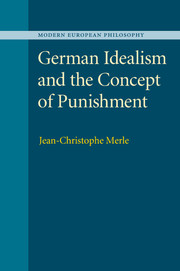Preface
Published online by Cambridge University Press: 04 August 2010
Summary
“Nemo prudens punit quia peccatum est sed ne peccetur,” says Seneca in De ira, and many philosophers who have come after him recommend such a justification of punishment by deterrence. Since Immanuel Kant, a completely different concept has spread among philosophers, considerably more so than among legal scholars and lawyers. According to Kant, the question of justification of punishment should not read: For what purpose punish? Rather, according to Kant's absolutist or categorical imperative regarding punishment, punishment can only be carried out because the malefactor is deserving of the punishment. Everything else is allegedly unjust, and is detrimental to the malefactor's human dignity as a moral subject. Such a theory of retributive justice, which draws not only from Kant but also from G. W. F. Hegel, inspires a great deal of fascination in many philosophers, but that notwithstanding it still stands on shaky ground. A precise analysis of Kant's and Hegel's philosophy of law and morality leads rather to a special form of deterrence theory.
I will attempt to conduct this analysis within the confines of this book. The analysis begins with Kant, continues with J. G. Fichte and Hegel, leads to Friedrich Nietzsche, and then concludes with a discussion of the justification of punishment for crimes against humanity. This closing discussion should be seen as the touchstone. Should my position be able to explain this difficult case, then it should be even more able to explain cases of lesser difficulty.
- Type
- Chapter
- Information
- German Idealism and the Concept of Punishment , pp. xi - xiiPublisher: Cambridge University PressPrint publication year: 2009

